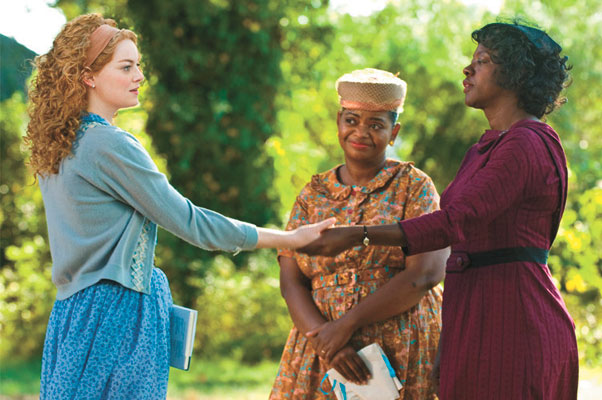Novelist Kathryn Stockett and screenwriter/director Tate Taylor
were preschool classmates, and when her book “The Help” was
finished, she brought it to her long-time friend. The movie with
the same title is nothing short of fabulous- a complex story of the
relationships between Jackson, Mississippi women of privilege and
their house maids unfolding in the tumultuous year of 1963.
Bridging the worlds of whites and blacks is a misfit named
Skeeter Phelen (Emma Stone), a recent journalism graduate who has
returned home to care for her cancer-stricken mother (Allison
Janney). Filled with literary ambitions, she takes a job writing
the household advice column for the local paper and turns to
friend’s knowledgeable maid Abileen (Viola Davis) for advice. This
one-sided arrangement grows into something much deeper as Skeeter
prompts Abileen to share insightful tidbits of what it is really
like to work as the help. Abileen is a font of wisdom, for in
addition to cooking and cleaning, she is the caregiver for two
generations of white children, including Mae Mobley (Eleanor
Henry), the preschool girl whose mother, Elizabeth Lefolt (Ahna
O’Reilly), has completely abdicated her role as a parent.
In this period of American history, Mississippi and neighboring
Alabama were the Deep South-a strictly segregated sub-culture where
African-Americans not only rode in the back of buses, they had
separate schools, drinking fountains and entrances to movie
theaters and department stores. As I discovered in this film,
housemaids were even passed on to the next generation in people’s
wills as though they were still enslaved and had no say in their
future.
Roles were sharply defined and supported by racist state laws
which prohibited “Whites” from co-mingling socially with
“Coloreds.” This mind-set is personified by Hilly Holbrook (Bryce
Dallas Howard) a woman who has created a campaign to require that
every white person’s home have a toilet designated “Coloreds Only.”
If the house doesn’t have two bathrooms, an additional one must be
built-preferably in an outbuilding or garage. Hilly repeatedly
tries to get her old school chum, Skeeter to write about her
campaign in the Women’s Club Newsletter, but somehow Skeeter is too
busy with her mother, and month after month goes by without a
single word about Hilly’s great idea.
Hilly’s maid Minny (Octavia Spencer) used to care for her as a
child when she worked for Hilly’s now semi-senile mother, Miss
Walters (Sissy Spacek). Upset that the baby who used to love her
has become a shrew of an employer, Minny has a rebellious streak,
and when she uses the family bathroom during a heavy rainstorm
instead of going outside to squat behind the bushes, Hilly fires
her.
Hilly goes out of her way to make sure Minny can’t find work,
and when Minny appears at the door bearing her famous chocolate pie
as an offering, Hilly invites her inside and offers to take her
back-with a cut in salary. Instead, Minny leaves and eventually
finds work with another of Hilly’s pariahs-a woman named Celia Rae
Foote (Jessica Chastain), a pretty, white-trash girl from
out-of-town who married Hilly’s former boyfriend. Never having a
maid before, Minny needs to teach her new employer the rules-like
not sharing a table for lunch or giving a maid a ride home.
Despite Skeeter’s pressure, Abileen can’t convince her best
friend Minny to tell her stories. “It’s just too dangerous,” Minny
says, and seems to be proved right when Medgar Evers is shot and
killed one hot night in July. That death becomes a
catalyst-bringing a dozen maids together to share their stories
with Skeeter. And when the advance check arrives for a book written
by Anonymous, Skeeter divides the proceeds evenly among herself and
each of the maids who helped her.
But that’s not the end of the story.
Comments? E-mail gi*********@*****st.net.








